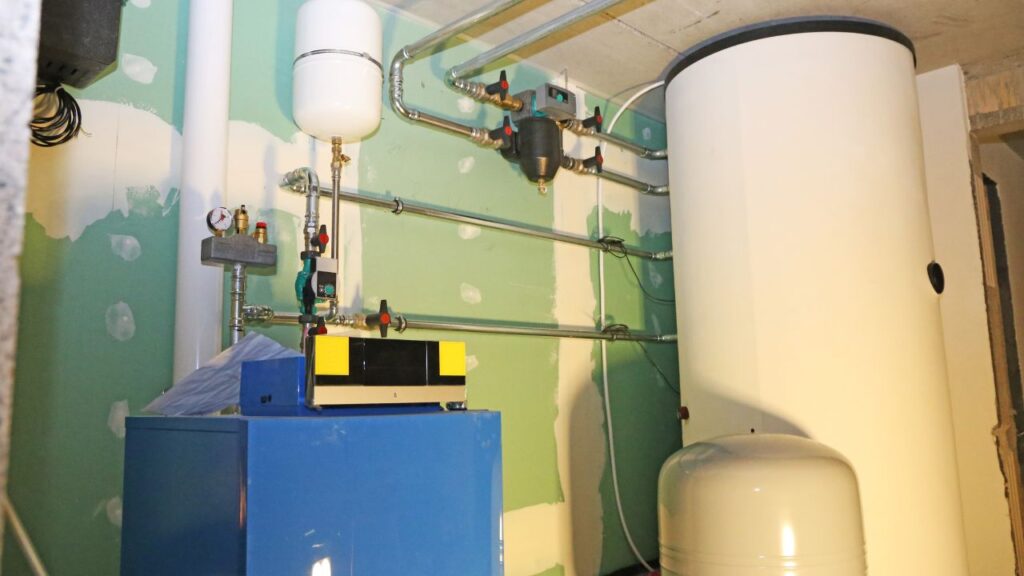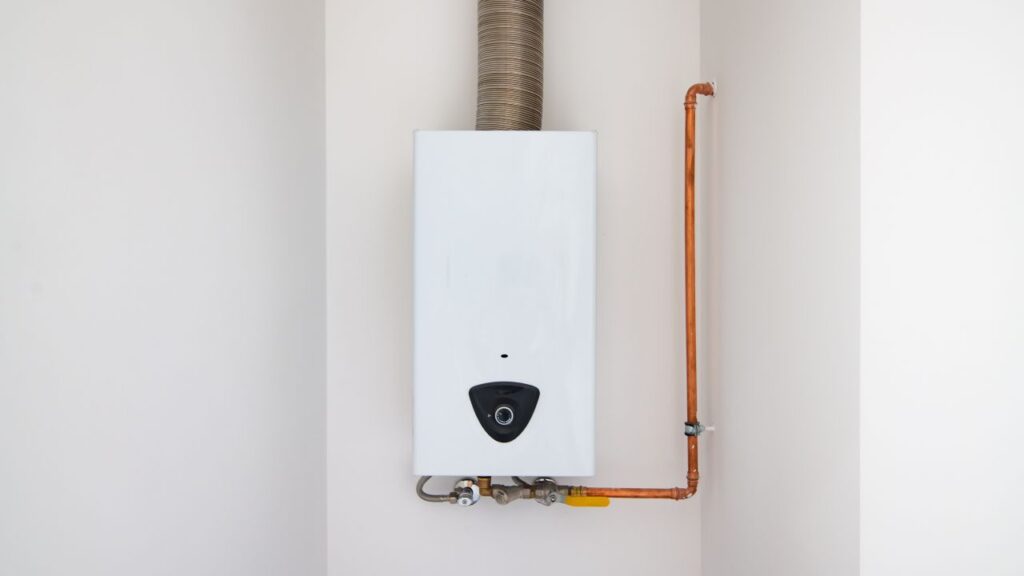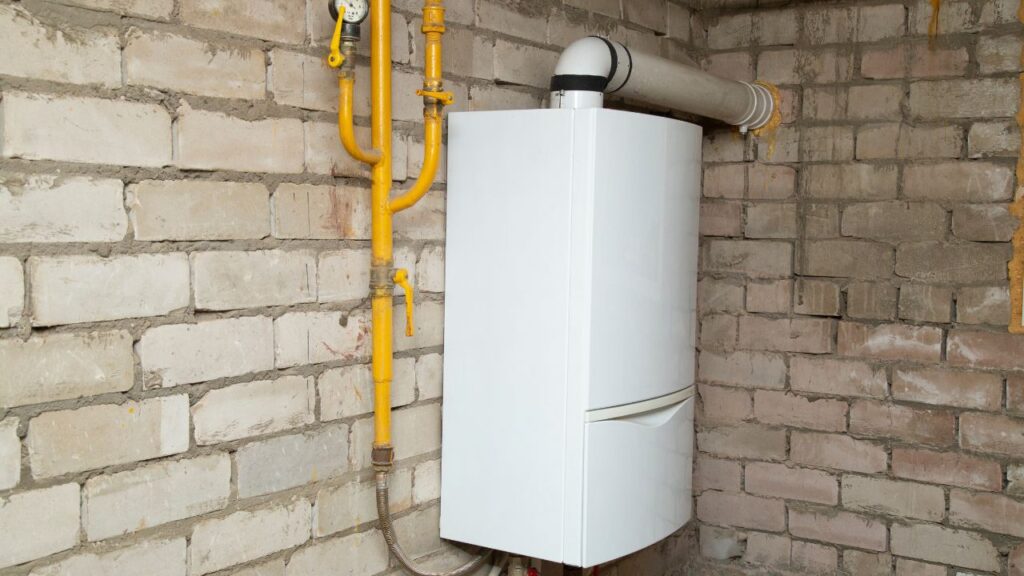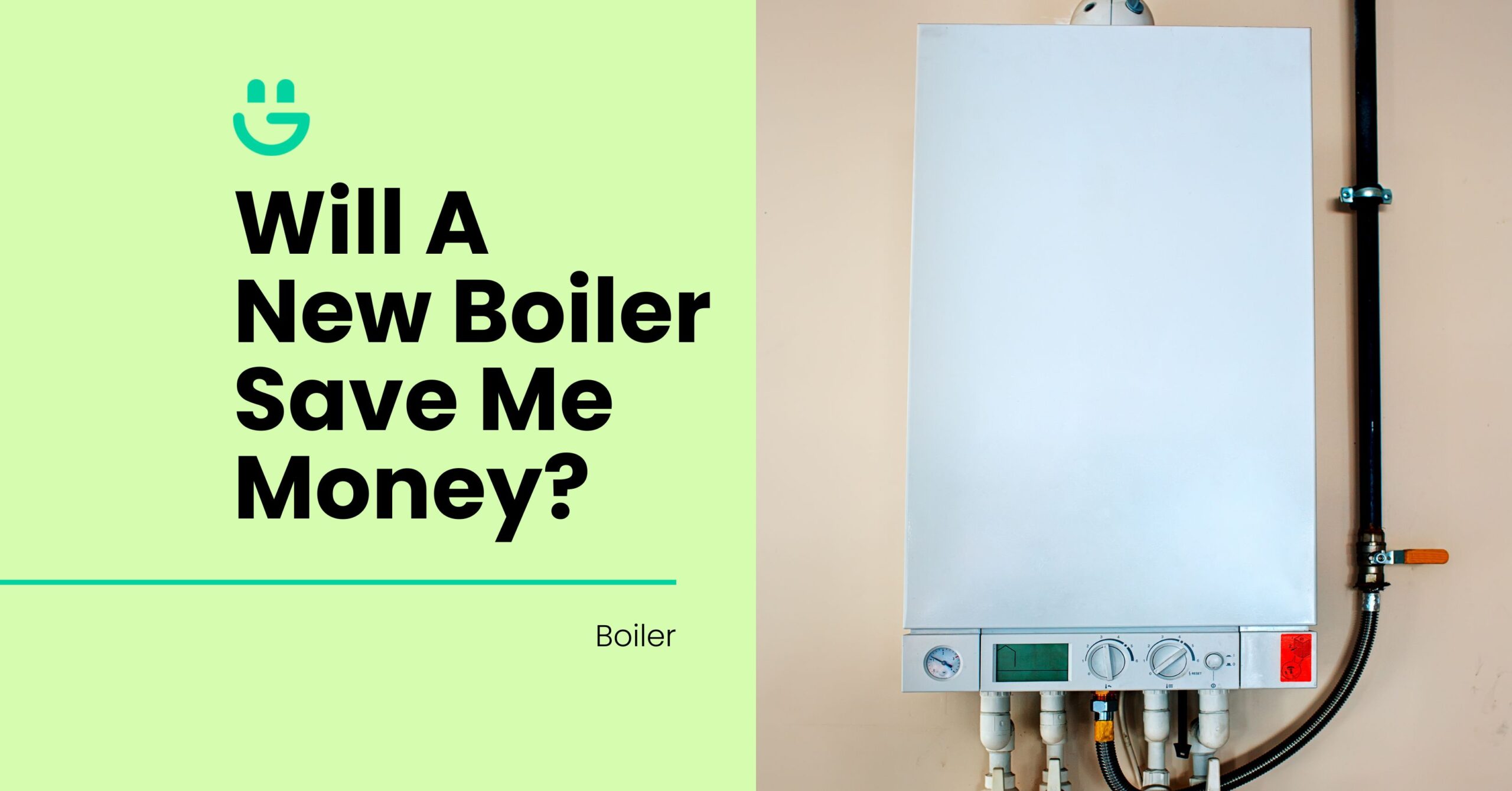Last Updated on November 14, 2025
Yes, a new boiler will save you money. Modern boilers are extremely energy-efficient, which means they use less fuel (like gas and electricity), reducing your heating bills. New boiler models are also technologically advanced, extracting more heat from the fuel source, resulting in less waste and more savings.
In this article, we’ll look at how a new boiler will save you money, the meaning behind different efficiency ratings, why you should upgrade your boiler, how to maximise your boiler’s efficiency, and what government boiler replacement programs are out there.
Contents
Why A New Boiler Saves You Money

Here’s how, and why, a new boiler can save you money:
- Older boilers are not compliant with the latest UK efficiency standards. That means they’re a massive drain on your heating system when they don’t need to be.
- Modern boilers, such as combi boilers, have a higher energy-efficiency rating, which means they use less fuel to provide the same (if not more) heat and hot water.
- Old boilers are also at an increased risk of breaking down. If they break down, you’ll have to pay for repairs. If you want to learn how old your boiler is, check out our guide.
Next, we’ll discuss what exactly boiler efficiency ratings are. These ratings are key to determining how efficient and cash-saving a boiler is.
Understanding Boiler Efficiency Ratings
As mentioned, new boilers save you money thanks to their energy efficiency, which means less energy is wasted and more energy is converted to heat.
Boilers are broken up into categories by their operating efficiency and environmental impact.
The two types are standard and high-efficiency boilers.
Standard boilers operate at an efficiency of roughly 80-85%. That means that around 80-85% of the fuel the boiler uses is converted into heat. The rest misses your heating system and goes up the chimney or down the drain.
High-efficiency boilers (like condensing boilers) have efficiencies of around 90% and higher. This is achieved by catching any water vapour in exhaust gases and trapping its heat.
What does that mean in terms of money? For each £1 spent on fuel, 90p is converted into heat.
To be worth the investment, a new boiler should have a high energy-efficient rating.
SEDBUK Ratings
The Seasonal Efficiency of Domestic Boilers in the UK (SEDBUK) was developed as part of the government’s Energy Efficiency Best Practice Programme. It’s the average annual efficiency that a boiler achieves in domestic conditions.
It’s ranked on a scale from A (90%+) to G (less than 70%).
Some of the highest-rated boilers are:
- Viessmann Vitodens 050-W 29kW (A-rated)
- Worcester Bosch Greenstar 8000 Combi (A-rated)
- Vaillant ecoTEC plus Combi (A-rated)
Some G-rated boilers to steer clear of include:
- Baxi Bermuda
- Baxi Boston
- Barlo Blenheim
- Caradon Ideal Calvacade
ErP Directive
The Energy-related Products (ErP) Directive is a European Union regulation. It’s designed to improve energy efficiency on anything that influences your energy bills, including your heating system and boiler.
ErP ratings are ranked from A+++ (the most efficient) to G (the least efficient).
The ErP aims to minimise CO2 emissions, phase out old boiler models, and reduce energy consumption. According to ErP requirements, only A-rated boilers and up can be installed in homes.
Domestic boilers must have an ErP rating and efficiency of at least 92% (which is A and above) before they’re allowed to be installed.
Here are some A-rated boilers to consider:
- Viessmann Vitodens 100-W
- ATAG iS system boiler
- Baxi 800 system boiler

Government Programs For Replacing Old Boilers
The UK has two government programs available to help you replace your existing boiler with a new one.
Warmer Homes Scotland Scheme
The Warmer Homes Scotland Scheme is funded by the Scottish Government. The scheme provides energy-efficient home improvements to homes that are struggling with their energy bills.
The goal of the scheme is to help those in fuel poverty heat their homes through various means, including boiler upgrades.
Homeowners and private tenants in Scotland who meet the criteria can apply to have their central heating system upgraded. The best part? The government will pay the full cost to have a new boiler installed!
Boiler Upgrade Scheme
The Boiler Upgrade Scheme is an initiative by the UK Government that provides grants to cover the cost of replacing older, fossil-fuel-burning heating systems with modern boiler alternatives.
This includes older boilers that use oil, gas, and electricity to generate heat. Basically, anything that produces carbon emissions.
If you’re a homeowner and are planning to install a new heating system or want to replace a fossil-fuel heating system, you’re eligible to apply.
You’ll need an Energy Performance Certificate and must have no outstanding recommendations for insulation installation.
It’s important to note that the Boiler Upgrade Scheme is only available to households (i.e. not businesses). It’s also limited to the UK; however, regulations may differ slightly in Scotland and Northern Ireland.
You can apply for the scheme on the UK Government website.
Why You Should Upgrade To A New Boiler
You should upgrade your boiler because a modern boiler will save you money and reduce your carbon footprint.
Let’s discuss in greater detail why it’s a good idea to upgrade your boiler.
Increased efficiency
A new boiler (like a combi boiler) is much better at making the most of your resources. A new boiler can convert over 90% of your fuel into heat, as opposed to 60-80% for older boilers. They’re also more consistent in their performance. To top it off, they can come with advanced features that allow for better control over heating, which helps you save on your heating bills even more.
Increased property value
Properties with an efficient central heating system are at a competitive edge. Because there’s less need for repairs on newer systems, the value of the property goes up. On top of that, potential buyer concerns go down.
Renewable alternative
A new boiler can often integrate with renewable energy sources, like solar panels. This means you’re cutting down on costs more and reducing your carbon emissions.
In many areas, there are also incentives and rebates for cutting down on your fuel use. So, an efficient boiler could actually make you money!
Oil boilers will likely be banned for installation in 2026, and phased out completely by 2035. So, it’s inevitable that you’ll have to make the switch to a more efficient boiler at some point.
Alternative heating systems that are compatible with renewable energy sources include:
- Ground source heat pumps
- Solar thermal panels
- Air source heat pumps
- Biomass boilers
The best alternative is definitely a biomass boiler. These can save you a lot of money as they use materials like wood chips, pellets, and logs to generate heat.
And it’s not just the fuel sources that are affordable. Biomass boilers are less expensive than most other heating systems. To top it all off, upgrading to these boilers is covered by the Boiler Upgrade Scheme in most areas.

Maximising Your Boiler’s Efficiency
To maximise your boiler’s efficiency, you should:
Service your boiler annually
Servicing your boiler annually is really important because it optimises your boiler’s efficiency, and your warranty won’t be void.
You need to call a qualified technician to check that your boiler is working safely and properly. The technician will check for malfunctions, leaks and blockages. While this may seem like an inconvenience, the amount of energy and money you could waste from a malfunctioning boiler is much more impactful.
So, have a technician come around. You may not know when you’ve actually got an inefficient boiler until it’s too late for repairs.
Regularly check boiler pressure
You need to regularly check your boiler pressure to ensure it is working optimally and not leaking or experiencing any other problems.
You can usually find the pressure gauge on the front of your boiler. The normal pressure for a boiler is between 1 and 2 bars. So, if it’s sitting in that range, great! However, if it isn’t, it’s best to call a technician as it could mean that your boiler isn’t operating effectively.
This is such a simple thing to do and could prevent you from landing in hot (or should we say, cold) water. Plus, a boiler working properly is a boiler saving you money as you won’t be spending money on repairs.
Insulate boiler pipes
Insulating the pipes that connect to your boilers can prevent heat loss, especially during the colder months. As water travels from your boiler to your radiators or taps, uninsulated pipes can result in the water cooling prematurely. This means that your boiler will need to work even harder, burn more fuel and cost you more to keep your central heating system at an optimum temperature.
Insulation can also help protect your pipes from freezing over and bursting in cold weather, which could save you costly repairs!
Check out radiators
You need to check your radiators because they can trap air at times, which can prevent them from fully heating up. Bleeding your radiators annually is a good way to ensure they’re working properly, and that you’re not wasting energy or money.
Clean your boiler’s parts
You need to clean your boiler’s parts to remove debris and ensure it is working properly.
One area you should clean regularly is the heat exchanger. This part can gather soot, dirt, and debris, leading to a less efficient boiler. Giving them a good clean every few months is a great way to ensure your boiler keeps running smoothly. And a smoothly running boiler is guaranteed to last longer and run more efficiently – thereby saving you money on repairs.
FAQs
At what age should a boiler be replaced?
If you maintain your modern boiler and have it serviced annually, you can expect it to last for around 15 years. However, if you have an older boiler, it won’t likely last this long, even with regular services.
Do boilers lose efficiency with age?
Yes. Even if you service your boiler regularly, it will become less efficient with age. The efficiency of a boiler usually starts to decrease between 10 and 15 years. So, thankfully, it’s not an overnight shift.
Does switching the boiler off save electricity?
Switching off your boiler might save you money. However, it will depend on the type of boiler you have. For example, switching off an old boiler in the summer will save you money but switching off a more modern boiler won’t. Some modern boilers don’t burn fuel such as gas when they’re not being used to produce hot water.
Should I turn my boiler off at night?
This may seem like another way to save money and electricity. However, turning off your boiler during the night won’t necessarily save you money, so there’s no real point in doing this unless you’re going away for a couple of nights.
Conclusion
So, will a new boiler save money? Yes. And will it help the environment? Yes!
While the initial cost of a new boiler may be high, the impact of your current boiler on your energy bills and the efficiency of your central heating system may actually cost you more in the long run.
And, with government schemes readily available, you may not even have to worry about the installation cost, either!
If you need help with your boiler upgrade options, contact Eco Happy for guidance! If you got value from this article, you might like our guide on how to save on your electricity bill. Or if you use gas, read our guide on how to reduce your gas bill.





